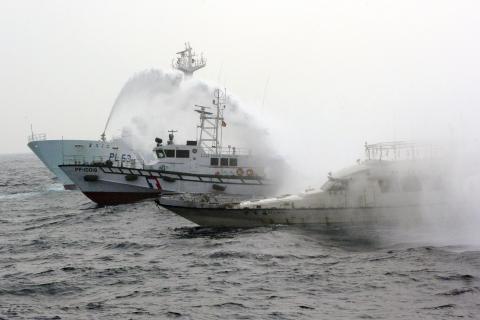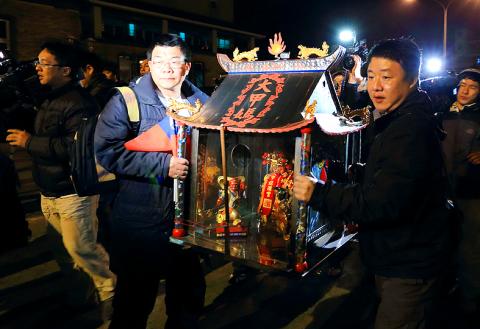The Ministry of Foreign Affairs (MOFA) yesterday urged Japan to adopt a “rational” attitude about a Taiwanese protest boat that sailed into waters near the disputed Diaoyutai Islands (釣魚台) earlier in the day.
“The voyage was a voluntary action by private citizens and should in no way affect Taiwan-Japan fishery talks,” said Su Chii-cherng (蘇啟誠), the deputy director-general of the ministry’s Department of East Asian and Pacific Affairs.
The boat, a fishing vessel chartered from Shenao Port (深澳漁港) in New Taipei City (新北市) and carrying seven crew and activists, set out early yesterday morning for the Diaoyutais, known as the Senkakus in Japan.

Photo: Taiwanese Coast Guard Administration / Reuters
The Diaoyutais lie in the East China Sea, about 120 nautical miles (220km) northeast of Taiwan, and are contested by Taiwan, Japan and China.
The activists are members of the Taipei-based Chinese Association for Protecting the Diaoyutais and said they had intended to enshrine a statute of Matsu, the Chinese goddess of the sea, on the uninhabited chain to protect Taiwanese seafarers and fishermen operating in the region and assert Taiwan’s sovereignty over the islands.
Despite being escorted by four Taiwanese Coast Guard Administration (CGA) vessels, the activists’ attempt to reach the islands was unsuccessful, although they managed to get as close as 16 nautical miles southwest of the islands.

Photo: CNA
Eight Japanese Coast Guard vessels blocked the Taiwanese boat’s progress when it reached 28 nautical miles southwest of the Diaoyutais at 9:40am, using tactics such as zig-zagging, creating wash and discharging black smoke, CGA officials said.
At 10:32am, the Japanese coast guard ships began firing water cannons at the fishing boat, they said. The CGA reacted by returning water cannon fire at the Japanese ships.
In addition, loudspeakers and LED display boards were used to send warning messages telling the Japanese to stop blocking the Taiwanese boat because “the Diaoyutai Islands are part of ROC [Republic of China] territory,” the officials said.
Also during the escort operation, Taiwan warned three Chinese marine surveillance ships that were spotted 20 nautical miles southwest of the Diaoyutais to leave the area, the officials said.
The action was aimed at avoiding the possibility of creating the false impression that Taipei was collaborating with Beijing over the territorial spat, the officials said.
Su yesterday said that Tokyo has expressed its concerns to the ministry over the incident.
“We have in turn reaffirmed our stance on the issue,” Su said.
Insisting that the Diaoyutais are an inherent part of the ROC’s territory, Su said that the waters surrounding the island chain are traditional Taiwanese fishing grounds.
“Our sovereignty over the Diaoyutais and their surrounding waters is indisputable,” Su said.
Su added that all those aboard the ship possessed the proper licenses and had applied to make the voyage in accordance with regulations.
“Our people are allowed to conduct fishing operations in the region,” Su said, adding that the CGA’s deployment of four escort ships was mainly to protect the safety of ROC citizens.
He urged Japan to adopt a “rational and peaceful” attitude in handling the incident.
Asked whether the dispute would hurt planned bilateral fisheries talks, Su said the Japanese had hinted at such a possibility.
“Both sides have been in talks to determine a timeline for a second preparatory meeting ahead of a new round of fishery talks,” Su said, adding that the government does not want the protest to affect negotiations.
“We look forward to the second preparatory meeting being held either late this month or in mid-February as originally scheduled,” Su added.
Taipei and Tokyo have already held 16 rounds of talks on fishing rights in the Diaoyutai waters. A preparatory meeting was held last year to pave the way for a long-stalled 17th round of talks.
The long-simmering row over the island chain came to a head in September last year after the Japanese government bought three of the islets from their private owner.
Chinese patrol ships, utility aircraft and jet fighters have since been spotted around the disputed island cluster on several occasions.
In August last year, President Ma Ying-jeou (馬英九) unveiled an East China Sea peace initiative based on the concept of “sovereignty cannot be shared yet resources can be divided.”
The initiative calls for all parties to refrain from provocation, shelve their differences, maintain dialogue, observe international law and resolve disputes through peaceful means.
Ma also called for all sides to seek consensus on a code of conduct for the East China Sea and to establish a mechanism to explore and develop resources in the region.

SECURITY: As China is ‘reshaping’ Hong Kong’s population, Taiwan must raise the eligibility threshold for applications from Hong Kongers, Chiu Chui-cheng said When Hong Kong and Macau citizens apply for residency in Taiwan, it would be under a new category that includes a “national security observation period,” Mainland Affairs Council (MAC) Minister Chiu Chui-cheng (邱垂正) said yesterday. President William Lai (賴清德) on March 13 announced 17 strategies to counter China’s aggression toward Taiwan, including incorporating national security considerations into the review process for residency applications from Hong Kong and Macau citizens. The situation in Hong Kong is constantly changing, Chiu said to media yesterday on the sidelines of the Taipei Technology Run hosted by the Taipei Neihu Technology Park Development Association. With

CARROT AND STICK: While unrelenting in its military threats, China attracted nearly 40,000 Taiwanese to over 400 business events last year Nearly 40,000 Taiwanese last year joined industry events in China, such as conferences and trade fairs, supported by the Chinese government, a study showed yesterday, as Beijing ramps up a charm offensive toward Taipei alongside military pressure. China has long taken a carrot-and-stick approach to Taiwan, threatening it with the prospect of military action while reaching out to those it believes are amenable to Beijing’s point of view. Taiwanese security officials are wary of what they see as Beijing’s influence campaigns to sway public opinion after Taipei and Beijing gradually resumed travel links halted by the COVID-19 pandemic, but the scale of

A US Marine Corps regiment equipped with Naval Strike Missiles (NSM) is set to participate in the upcoming Balikatan 25 exercise in the Luzon Strait, marking the system’s first-ever deployment in the Philippines. US and Philippine officials have separately confirmed that the Navy Marine Expeditionary Ship Interdiction System (NMESIS) — the mobile launch platform for the Naval Strike Missile — would take part in the joint exercise. The missiles are being deployed to “a strategic first island chain chokepoint” in the waters between Taiwan proper and the Philippines, US-based Naval News reported. “The Luzon Strait and Bashi Channel represent a critical access

Pope Francis is be laid to rest on Saturday after lying in state for three days in St Peter’s Basilica, where the faithful are expected to flock to pay their respects to history’s first Latin American pontiff. The cardinals met yesterday in the Vatican’s synod hall to chart the next steps before a conclave begins to choose Francis’ successor, as condolences poured in from around the world. According to current norms, the conclave must begin between May 5 and 10. The cardinals set the funeral for Saturday at 10am in St Peter’s Square, to be celebrated by the dean of the College